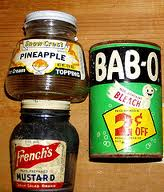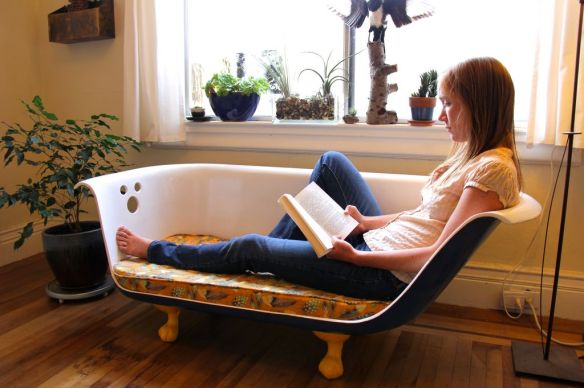In Florida, most people take baths once a day. It’s too hot not to. And it’s a safe bet most people in contemporary America take more than one bath a week.
Not so in the olden days. Mildred Armstrong Kalish writes of her family’s once-a-week bathing in her chock-full-of-detail memoir of growing up on an Iowa Farm during the Depression and vividly describes the extra bath needed on days working in the hay-field:
When dusk came after a day like this [reaping and storing hay], Mama would fetch a steaming kettle of water from the kitchen stove and bring it out to the porch where, during the summer months, we set up a washing station which consisted of a wooden bench, an enamel wash basin, clean towels, a mirror, and a pail of fresh water for drinking or to temper the hot water. She started with us girls, giving us a soaping from head to toe and sending us, towels and nightgowns in hand and naked as jaybird, across the grassy lawn to the windmill. Once there, Sis and I pumped pails of refreshing cold water and doused each other all over until we fairly tingled. After we dried ourselves, we donned our cotton nighties and ran back to the house and up to bed. We would be dead to the world in minutes.
In the Longenecker family, mirrors, pumps, and windmills were not involved in the bathing process, but we did bathe once a week whether we needed it or not—usually on a Saturday night before Sunday church. The exceptions were a visit to the doctor or getting rid of ickiness after sickness. Then we called the bath a “rinse off.”
Before our house had a “real” hot water heater, there was an apparatus in the cellar that could have heated water year round. But it was not used in the summer because “It’s just too hot to run that thing when it’s so hot outside already!” So June – August or September, our bath water was heated in a tea kettle or large pan on the kitchen stove and carted in buckets upstairs to the bathroom. Baths were taken in the order of cleanliness, or lack thereof. Usually bath time started early Saturday evening with my sister Jean and Janice, the two youngest, together in the tub with a fragrant bar of Ivory soap, the soap that floats! Soon it was my turn, then Mother, and finally Daddy, a farm equipment mechanic, who was the dirtiest of all.
After all the baths, the 99.44/100 % pure Ivory was made murky with all the build-up of grime, dyeing tub water a charcoal-ish, murky tone and a film of grease on top. It would take more than one scrubbing with BAB-O to restore the porcelain shine, for sure.
Did we get clean? I am sure youngest sister Jean did and probably Janice too. Were we frugal? Yes, and to a fault.
Let’s Talk: Your thoughts please!
What about your baths as a child? Any particular products you remember using?
What else are you curious about growing up Mennonite in the 1950s? What other topics would interest you?



Lovely weaving of one of my favorite books with some of those great nostalgic items from the 1950\’s. I had forgotten about Bab-O, but I recognized it as soon as I saw it. We too bathed only once or twice a week, but we had the luxury of running hot water. So we could start over with every person.
The tub love seat is a wonderful concluding image. What could be better, a container for memory and a container for reading?!
Yes, and both receptacles for reflection. Part of my favorite end-of-day ritual is to soak in a warm tub of soft water (my own alone, I have to say!) and relax and reflect.
I find different cultural views on cleanliness fascinating. I heard one fellow remark that he was horrified that his host family in Spain only took baths on a weekly basis, and I was amazed that not only will Indonesians bathe twice daily, they even bathe at the same time according to the call to prayer.
I guess there is no set way to do it RIGHT! RIght?
Lovely piece Marian. It made me remember how my brother and I used to run a bath on hot days and get in with our swimsuits. When we were older, our parents bought a house with a small pool and we just couldn\’t believe it. Right up until the day we moved, my brother kept saying: but does it really have a pool?
It sounds like your brother\’s sense of wonder is/was intact! How lovely to be surprised in a GOOD way.
Reminds me of Almanzo Wilder\’s description of the family baths (through Laura Ingalls) in Farmer Boy. We take so much for granted.
I love it when readers remind me of the same theme in different authors, like Ingalls. I\’ll have to check this out. Thanks for the prompt.
There\’s a picture in that chapter of Farmer Boy. Not exactly what you describe, but certainly closer to it than the conveniences we take for granted.